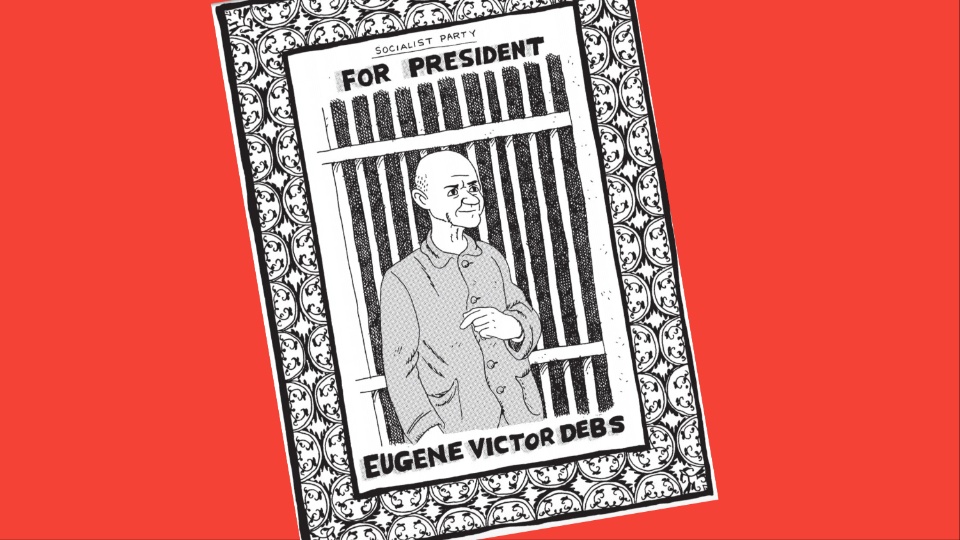
Bernie Sanders called him “the most effective and popular leader that the American working class has ever had… one of the most important Americans of the 20th century.” Yet his face has never appeared on a U.S. postage stamp, an achievement emblematic of having “made it” in the American history books. We speak of the longtime Socialist Party leader and many-times candidate for the presidency, Eugene Victor Debs.
It might be hard, in a long life of militant activism, to single out a unique defining moment of the man and his party, but surely among the most salient is Debs’s outspokenness in leading the Socialists (many of them anyway) to public opposition to World War I—for which he was sent to prison. What virtue would accrue to the global working class for it to “fall upon each other and to cut one another’s throats for the profit and glory” of Europe’s—and America’s—ruling classes? Would that more of our ostensibly most forward-looking political leaders in our own day might have enough courage to apply this same principle to the ever-greater war budgets that are sapping our social and spiritual wealth!
Though Debs himself was never elected to public office, dozens of the Socialists he inspired went on in the early decades of the 20th century to historic careers in federal, state, and municipal governance. Their terms, some decades-long, were often marked by honesty and transparency, and success in what people referred to as “sewer socialism”—attention to the nitty-gritty of local policy that brought integrity and peace of mind to millions of taxpaying citizens. Many municipally owned energy departments today owe their existence to those days of public ownership of the means of production.
Debs’s name is permanently embedded into the story of epic labor battles in industrializing America. If he manifested a socialist politics emerging directly out of the populism of the American Midwest heartland, and elaborated a distinctly American vision of socialism that put down deep roots not just in America’s great immigrant cities but in agricultural states like Oklahoma, Ohio, Minnesota, and Wisconsin, his brand of socialism also had its weak links. It was a movement almost entirely of the male persuasion, and in most places, it tended to defer the great unspoken issue of racial discrimination to some later, more enlightened future.
As radical as the Socialists’ message was on many points, on these critical questions other groups showed greater awareness—the anarchists, the syndicalists of the Industrial Workers of the World (IWW), and in the immediate post-WWI and post-Russian Revolution period, the newly established Communist Party.
Why now for Eugene V. Debs: A Graphic Biography? It’s a mostly illustrated comic book-style treatment of Debs’s life geared toward inspiring a new generation of resisters appalled and frightened by the rise of Donald Trump. With the presidential campaign of Bernie Sanders, the rise of mass movements like Occupy and Black Lives Matter, and the Wall Street Crash of 2008, socialism once again made itself felt in American politics.
Indeed, this biography is published in collaboration with Democratic Socialists of America, whose membership rolls skyrocketed after the 2016 election to heights not seen among American socialist parties since the 1920s. DSA members are now sitting City Council members in any number of American cities. The long final chapter treats “The Debs Legacy,” with a quick summary of the Socialist fate under leaders such as Norman Thomas, Michael Harrington, and Sanders himself.

Noah Van Sciver’s illustrations are geared to a script by Paul Buhle, noted historian of the U.S. left, with Dave Nance and Steve Max, a founder of Students for a Democratic Society. The volume features a Time Line of Debs’s Life, an Introduction, five generously worded essays framing each chapter, and appreciative blurbs by socialist superstars Mike Davis, Barbara Ehrenreich, Ben Katchor, Bhaskar Sunkara, Eric Foner, Trina Robbins, John Nichols, and Samuel Norich.
The sheer amount of text, and the information it conveys, duplicates much of what will be illustrated, suggesting that from a conceptual point of view, an uncertain level of trust existed among the writers, artists, and editors as to the proper balance between word and image. After Buhle’s terse, fact-filled chapter lead-ins, many a reader might well find the illustrations redundant. On all too many pages, the composition of images jams together scenes whose relatedness is remote.
In their zeal to build up the Socialist brand, the authors cut certain corners. For example, a chart (p. 109) compares “The Socialist Platform of 1932” to “Programs Adopted by the Roosevelt Administration,” purporting to show how much FDR borrowed from Norman Thomas and his movement. But many of those programs (unemployment relief, pensions, health care, housing construction, etc.) were also the demands of the burgeoning labor movement in the early Depression years, as well as the Communist Party. Having said which, Buhle is generally fair and even-handed as to the role of the CPUSA.

Eugene V. Debs: A Graphic Biography is a thing of its moment with much enduring appeal, especially for those who might not be drawn to read a formal biography or, for example, the extensive writings of Philip S. Foner.
Paul Buhle, Steve Max, Dave Nance
Eugene V. Debs: A Graphic Biography
Art by Noah Van Sciver
Brooklyn: Verso, 2019, 140 pp.
ISBN-13: 978-1-78663-687-4
We hope you appreciated this article. At People’s World, we believe news and information should be free and accessible to all, but we need your help. Our journalism is free of corporate influence and paywalls because we are totally reader-supported. Only you, our readers and supporters, make this possible. If you enjoy reading People’s World and the stories we bring you, please support our work by donating or becoming a monthly sustainer today. Thank you!












Comments